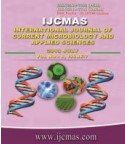


 National Academy of Agricultural Sciences (NAAS)
National Academy of Agricultural Sciences (NAAS)

|
PRINT ISSN : 2319-7692
Online ISSN : 2319-7706 Issues : 12 per year Publisher : Excellent Publishers Email : editorijcmas@gmail.com / submit@ijcmas.com Editor-in-chief: Dr.M.Prakash Index Copernicus ICV 2018: 95.39 NAAS RATING 2020: 5.38 |
Health care providers lacking proper diagnostic tools are usually unable to determine specific etiologies, often diagnosing patients with acute undifferentiated febrile illness (AUFI) presumptively based on clinical features and assumptions regarding circulating pathogens. Acute fever can be potentially fatal if the etiology is not recognized and treated appropriately. A cross-sectional study was conducted in a tertiary care hospital, Bengaluru, from July-December 2018. Blood was collected from patients with acute fever for peripheral smear, serological tests. Rapid diagnostic tests was done and later confirmed by ELISA. Negative samples were retested with ELISA for dengue, chikungunya and leptospirosis. A total of 100 patients with AUFI were evaluated. Of these, 54% were males and 46% were females. Majority were in the age group of 21-30years. Typhoid fever (27%), Dengue (19%), Scrub typhus (9%), Malaria (8%), Leptospirosis (1%), Chikungunya (1%) were the main infections detected. Mixed infections were noted in 9% patients. Specific diagnosis could not be delineated in 35% of patients. Implementation of standardized protocol for the assessment of AUFI helps in managing the disease with cost effective treatment and reduces antibiotic resistance.
 |
 |
 |
 |
 |